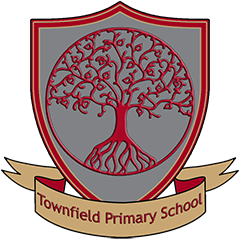Curriculum
Townfield Curriculum 2023 -2024
The curriculum offer for all children follows the breadth of the National Curriculum and Development Matters in the EYFS. It is ambitious and designed to give all learners, particularly the most disadvantaged and those with special educational needs and disabilities, the knowledge and cultural capital they need to succeed in life. As a result of the curriculum taught children know more and remember more.
A knowledge rich curriculum leading to clearly defined end points
The curriculum is knowledge rich as knowledge enables comprehension. Skills are dependent on knowledge.
The curriculum is made up of clearly defined end points in terms of what children know and can do by certain points. End points are the most important knowledge that we want children to know, remember and apply. Knowledge can be substantive (factual content - knowing what) or disciplinary (the action taken within a particular subject to gain knowing - knowing how to).
In some subjects the end points are marked at the end of the unit, in others it will be at the end of a year. This will differ due to the nature of knowledge within each subject, for example, in history substantive knowledge is marked at the end of a unit and disciplinary knowledge at the end of a key stage.
Where required, pedagogy is adapted so that all pupils including disadvantaged pupils and those with SEND are on the same knowledge journey towards the same endpoints.
The curriculum knowledge broken down into components (building blocks) so it is clear what pupils need to know and be able to do to reach the end points. The curriculum is planned and sequenced so that new knowledge and skills build on what has been taught before and towards its clearly defined end points.
End point documents from Nursery to Year 6 have been developed for every subject.
Some subjects have key concepts which are revisited at different points in the curriculum, for example, in history, key concepts include monarchy and legacy. The repetition and review of concepts helps children build on prior knowledge. These concepts are set out in VOCUS documents.
Implementing end points
- In lesson teachers ensure that the most important knowledge (leading to end points) are clear.
- Teaching sequences ensure that learning builds towards achieving these end points.
- End points are a focus for recap and review. Review and retrieval is a key part of every lesson.
- Teachers continually check for understanding around the end points.
- Working walls prioritise end points.
- End points are prioritised as essential learning for SEND (level 1, 2, 3 but bespoke for small number of children on level 4 and 5)
End points enable us to review the impact of the curriculum
The end points are critical in enabling us to review the impact of the curriculum ensuring children including those who are disadvantaged and have SEND know more and remember more. Reviewing end points involves:
- Summative assessment tests, tasks or final quizzes built around the curriculum end point
- Pupil voice and staff voice activities assess how pupils have learnt the most important knowledge
- Assessment of endpoints informs curriculum design and adaptation.
- Teachers complete a curriculum review at the end of each unit to support future curriculum planning and identify CPD needs.

Reading is a priority
We aim for all pupils, irrespective of their needs, abilities or background to learn to read fluently and with understanding. We aim to meet the expectations laid out in the Early Learning Goals and National Curriculum. We want to develop secure, confident, independent readers who enjoy and understand the benefits that reading brings. See our phonics and reading pages to find out how this is implemented.
.jpg)
Vocabulary is taught explicitly
The explicit teaching of vocabulary throughout the curriculum provides a rich understanding of words encountered and helps address social disadvantage. Teaching of vocabulary across the curriculum develops pupils’ wider language knowledge which underpins reading.
Vocabulary is taught explicitly in every lesson. Teachers focus on vocabulary identified in the planning/progression documents. Vocabulary is prioritised as part of retrieval practice.
An enriched curriculum
Our curriculum builds on the interests, strengths, talents and experiences of all our pupils, providing the ‘cultural capital’ they need to succeed in life. One way this is achieved is through enrichment opportunities. The enrichment leads works with subject leaders and class teachers to ensure there are enrichment opportunities for each subject across school that build on the knowledge gained within lessons.
Enrichment includes trips, visitors, Woodland Learning and extra curricular clubs. Enrichment opportunities enhance all curriculum areas throughout school.
All children in school have a weekly ‘Woodland Learning’ session. Sessions are carefully planned to enhance the curriculum in PSHE, Maths, Reading, Geography, DT, Art, Science and Music as well as personal development skills. Details are on our webpage Woodland Learning

If you would like further information regarding our curriculum please see our Curriculum Overview or curriculum subject pages.
You can also find information about the curriculum your child will be learning this year on their class page or by speaking to the class teacher.
 Townfield Primary School
Townfield Primary School
